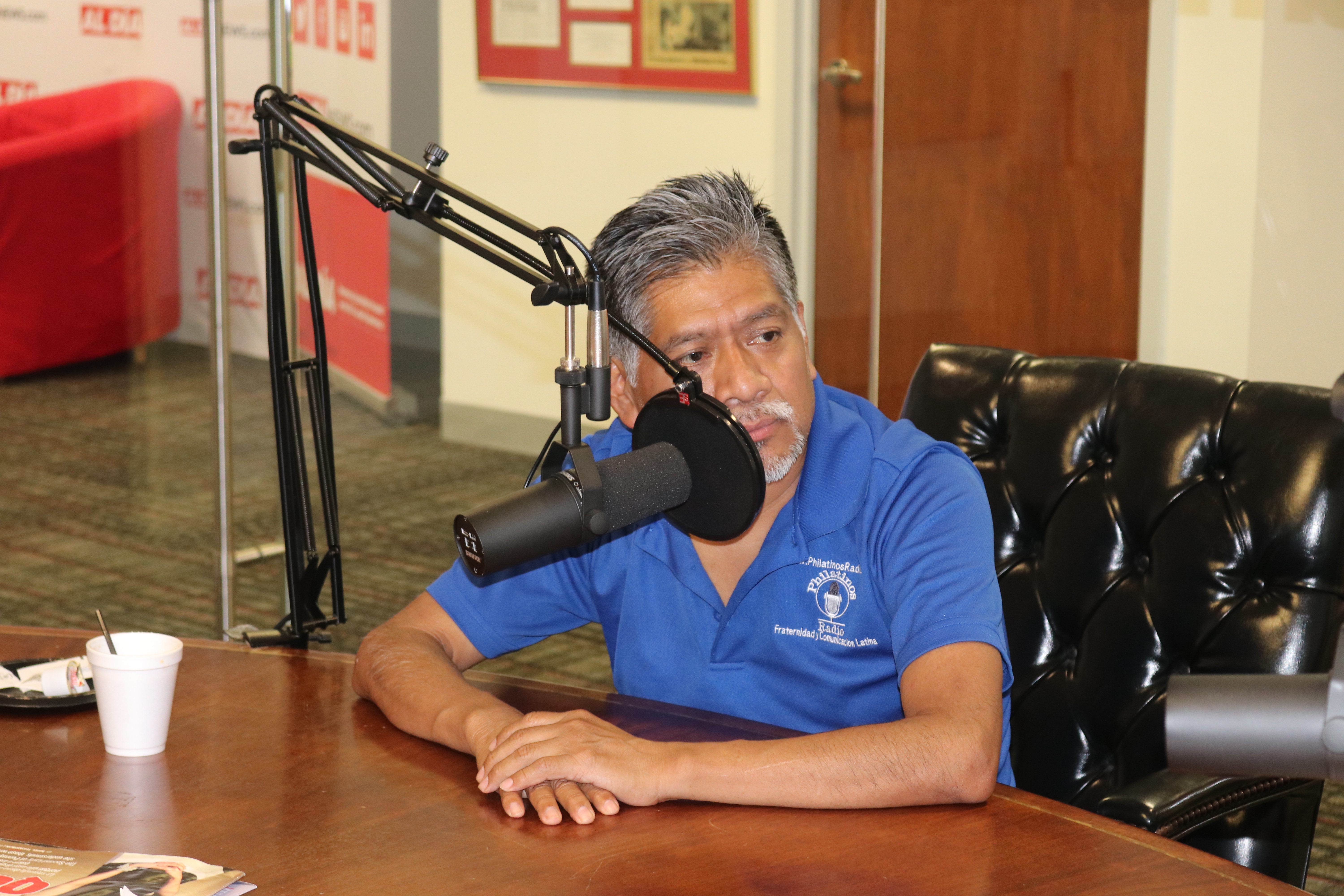
Philadelphia to celebrate its first Latin American Book Fair on October 4
Edgar Ramírez, founder and host of Philatinos Radio, is working with a group of organizers to hold the first celebration of literature in Spanish in…
While working in the Mexican Air Force decades ago, Edgar Ramírez was working at a job where he said there “wasn’t much to do, except obey.”
Often bored, he began to read, secretly, while on his shift standing watch.
One day, he was reading Colombian author Gabriel García Márquez’s masterpiece, One Hundred Years of Solitude, when his boss caught him in the act. He asked Ramírez what he was doing, and though afraid he would be dismissed for being distracted while on the job, Ramirez admitted he was reading a novel.
To his surprise, his boss responded to the confession with a smile, and asked his opinion of the novel and literature in general. After discovering that Ramírez enjoyed literature and had an inclination towards reading and writing, his boss began giving him more opportunities to do different jobs in his unit, like being an adviser and working on field investigations.

“Thanks to this incident I always have had the opportunity to work in other things apart from manual work, doing things exactly because of my habit of reading,” said Ramírez, the founder and host of Philatinos Radio, a community and digital radio station in South Philadelphia.
Ramírez is currently dedicated to his work at Philatinos Radio, but has always maintained this love of books. As a result, it’s rare to see him without a book in hand, which has won him the nickname: “Señor del Libro”.
Out of this great love of literature was born the idea of having a Latin American Book Fair in Philadelphia: a dream that Ramírez, Ana Omana, Leity Rodriguez-Largo, and a group of organizations and lovers of literature — including City Councilmember David Oh and cultural organizations like Acción Colombia, Casa de Venezuela, and Taller Puertorriqueño — are now making a reality.
On Oct. 4, the first Latin American Book Fair in Philadelphia will be held from 10:30 a.m. until 5:30 p.m. in the central patio of City Hall. More than 28 local authors will present their works in Spanish, and there will be workshops, music, and dance to celebrate literature in Spanish and lovers of Spanish books that live in the City of Brotherly Love.
In an interview with AL DÍA news on Sept. 10, Ramírez affirmed that the goal of the festival is not only to highlight the works of local authors who write in Spanish; it’s also to “promote reading for Latinos,” and make literature accessible with the goal of building a community that is a “fusion between writers and readers."
Ramírez believes that literature has a great power in forming community and preserving memory and identity. He credits his love of reading for much of what he has learned, and how it has helped him “open his mind.”
“I think that reading strengthens your imagination,” Ramírez said.
The richness of the Spanish language is an important part of the celebration, said Ramírez — now more than ever. Ramírez recalled an incident from some of his first days in the U.S., when he came to New York City in the early 2000s.
At the time, the magazine Vanity Fair had just published a comedic advice column in which someone suggested that she wanted to take Spanish classes. The character responded, in essence: “Why, are you having problems with the service?”
Ramírez understood the indignation shared by many Latinos at the time, who were outraged that the language with the second-highest number of native speakers in the world, and that has more than 40 million native speakers in the United States, would be characterized as a language that only Latinos, and only those working in manual labor, would speak.
But the incident also inspired Ramírez to think about how to confront the prejudice against Latinos and Spanish speakers in the U.S.
“Instead of complaining, why don’t we do something,” said Ramírez.
For the radio host, it is necessary to transform that prejudice against Spanish into appreciation, in a country that trails only Mexico as the country with the greatest number of Spanish speakers in the world.
“We want to say to the whole world that the United States doesn’t have an official language. So we can speak whatever language we want to, that we prefer, and how great it is that we can be multilingual,” said Ramírez.
According to Ramírez, it’s essential that the new generation of Latinos who have grown up in families that speak Spanish cultivate pride in the language, and see it not only as a connection to their family members, but also as a valuable tool and source of ideas and creativity.
“We want our children and young people to also feel identified with the fact that with Spanish, they can be proactive, they can be creative, they can do projects in Spanish, too,” he said.
RELATED CONTENT
“Sometimes I hear parents saying, ‘You have to learn Spanish so that you can speak with your grandmother, and in Mexico you can speak with your cousins.’ But I think that in Spanish you can do many other things, like write literature, read literature, create proposals,” said Ramírez.
Ramírez believes that every person has a story to tell, and that the appreciation for literature also includes narratives that are told in forms beyond the printed page.
“I didn’t have a university education, but [thanks to] my habit of listening to elders and their oral stories, I learned many things, and that sparked an interest for me in learning more through reading,” said Ramírez.
Though the radio host currently writes in some blogs, he said that when he first left Mexico and moved to New York, it was his dream to write his own book. But when he came to Philadelphia in 2006, after living in New York for two years, he realized that there were many stories that hadn’t been told yet among the Mexican immigrant community and beyond. Ramírez’s focus as a storyteller changed.
“That has been one of the most important things that I’ve done, is listening to the story of Latinos in the United States: Many stories of success, many stories of work, many stories that are also tragic,” said Ramírez.
In Philatinos Radio, these personal narratives take the form of oral storytelling, which for Ramírez consist of “stories here that we can rescue.”
“I think that every human being at some point in our lives wants to write a book...we want to tell a story,” said Ramírez.
And storytelling itself, says the radio host, can strengthen both individuals and entire communities.
The goal of an event like the Latin American Book Fair is to create a “group of writers that can coexist with their readers, and know that although these are intimate stories, they can serve to help us better understand ourselves...to be able to put ourselves in the shoes of others,” said Ramírez.
The group is already in the process of planning next year’s Latin American Book Fair, with the hope of inviting authors well-known at the national and international level to participate and uplift literature in Spanish in the city.
But their first focus will be to ensure that the community created by the festival will continue, and that there will be activities and events throughout the year that writers and readers can attend.
The Latin American Book Fair Organizing committee is planning a workshop for sometime after the festival, and will have at least one activity per month that has to do with Spanish literature.
The First Latin American Book Fair will be held Oct. 4 from 10:30 a.m. to 5:30 p.m. For more information, visit the group’s web page, or their accounts in Facebook and Instagram.












LEAVE A COMMENT: